高一英语必修一unit3教案
Unit 3 Sports and Fitness Listening and 高一英语 必修一教案

Unit 3 Sports and FitnessListening and Speaking & Listening and Talking【教材分析】In this period, the theme is “sports and health”. Students will have a general understanding of how to invite a friend to a sports event and voice one’s own opinions about sportsmanship by listening and ultimately can form a healthy lifestyle and good attitudes towards sports.Listening and Speaking introduces the topic of sports events with posters advertising them, along with related vocabulary and grammar, and is a warm-up for the activities which follows.Listening and Talking introduces idea of sportsmanship by listening to a conversation, matching speakers’ opinions and giving and discussing one’s own opinions.【教学目标与核心素养】1. Instruct students to get main facts by listening and motivate them to talk about the topics about how to invite a friend to a sports event,voice one’s own opinions about sportsmanship by listening.2. Develop students’ sense of cooperative learning and individual thinking capability.3. Develop students’ different listening skills to solve different listening comprehensive problems.【教学重难点】1. Teach students how to focus on key words, not on single words or grammar.2. Prompt Ss to talk about the related topics, such as how to invite a friend to a sports event and voice one’s own opinions about sportsmanship.【教学过程】Part 1: Listening and SpeakingLead inThe teacher is advised to talk with their students about sports events.Boys and girls, look at the posters on p36, what sports events do you like to watch? Which sports would you like to try? After their small talk, the teacher can move on by finishing the following listening task:Play conversation 1 which is about Shen Qi’s main purpose for talking to Amy and after finishing listening for the first time, the students need to solve the following tasks.1. Purpose________________________________________________________2. Listen to conversation 1 again and write down the words that the speaker stresses: ______________________________________________________________After finishing the task above, the teacher is expected to play conversation 2 which is about Adam’s inviting Julie to a sports event and after finishing listening, the students need to solve the following task.Listen to Conversation 2. Then answer the following questions:1. When will the event happen?The event will happen___________________________________________________2. What's a "Blue Paint" run?A "Blue Paint" run is a fun run that_________________________________________3. Why is it called a "Blue Paint" run?Because people can buy water ballons flled with __________ and __________ the runners.4. If 200 people take part in the run and 400 balloons are sold, how much money will they collect?_____________________________________________________________________ Finally, after finishing the task above, the teacher is expected to instruct students to work in groups to finish the following project:Speaking ProjectWhat event or activity would you like to invite your friend to? Make a conversation with a partner.Ski Race: Zhangjiakou, a beautiful city in northern China, will host the Youth Ski Race in December.Track Meet: a great event for track –and –field lovers on 26 October.Gym Class: come and work out at a gym! You can make it.Part 2: Listening and Talking:The teacher is advised to talk with their new students about the related topic:Boys and girls , what do you think of sportsmanship? Let’s listen and find out: Play the listening and match each opinion with the right speaker. Who do you agree with? Why?Cao Jing _____________ Lily _____________ Max _____________A. An athlete should do his/her best to win.B. The girl should stop and help the other girl. Good sportsmanship is more important than wining!C. An athlete should think about honor and his/her fans if he/she is competing for his/her country.Talking projectWork in groups. Choose one of the situations below and make a conversation:●A soccer player should not pretend to fall down even if it helps his/her team.●In school teams, everyone should get a chance to play, not only the best players.●It is wrong to pay people millions of yuan to play sports.●Athletes should play only for their own country.EXAMPLEA: I agree with the idea that a soccer player should never pretend to fall down even if it helps his or her team. You should never cheat.B: Exactly! It's important to do the right thing.C: Well, don't think so. Many players do it, and they think it helps their team to win. A: That doesn't make any sense!B: I see what you mean, but the audience wants fair play.。
译林版高一英语必修第一册(2019版)_Unit3_Extended_reading_公开课教案
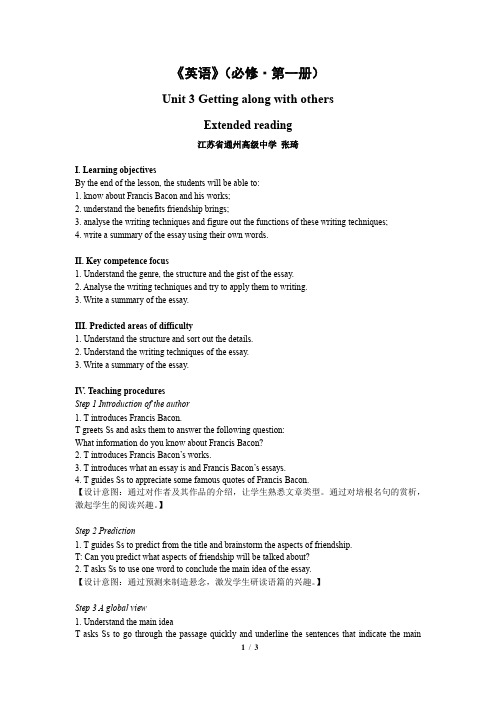
《英语》(必修·第一册)Unit 3 Getting along with othersExtended reading江苏省通州高级中学张琦I. Learning objectivesBy the end of the lesson, the students will be able to:1. know about Francis Bacon and his works;2. understand the benefits friendship brings;3. analyse the writing techniques and figure out the functions of these writing techniques;4. write a summary of the essay using their own words.II. Key competence focus1. Understand the genre, the structure and the gist of the essay.2. Analyse the writing techniques and try to apply them to writing.3. Write a summary of the essay.III. Predicted areas of difficulty1. Understand the structure and sort out the details.2. Understand the writing techniques of the essay.3. Write a summary of the essay.IV. Teaching proceduresStep 1 Introduction of the author1. T introduces Francis Bacon.T greets Ss and asks them to answer the following question:What information do you know about Francis Bacon?2. T introduces Francis Bacon’s works.3. T introduces what an essay is and Francis Bacon’s essays.4. T guides Ss to appreciate some famous quotes of Francis Bacon.【设计意图:通过对作者及其作品的介绍,让学生熟悉文章类型。
优质人教版必修1高一英语Unit 3 Travel journal 教案
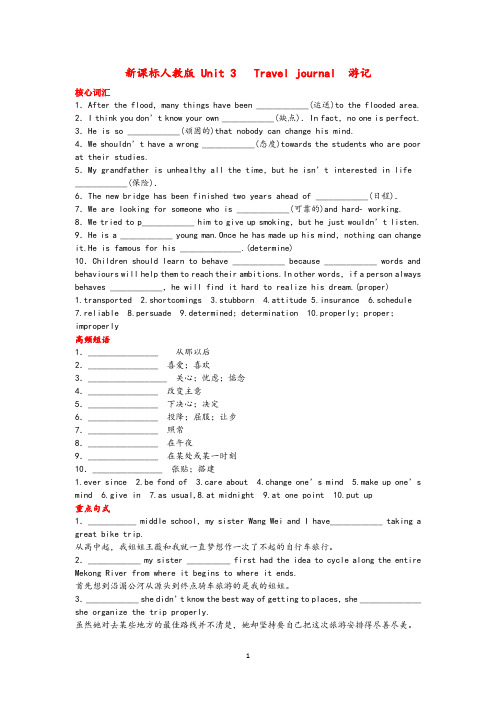
新课标人教版 Unit 3 Travel journal 游记核心词汇1.After the flood,many things have been ____________(运送)to the flooded area. 2.I think you don’t know your own ____________(缺点).In fact,no one is perfect. 3.He is so ____________(顽固的)that nobody can change his mind.4.We shouldn’t have a wrong ____________(态度)towards the students who are poor at their studies.5.My grandfather is unhealthy all the time,but he isn’t interested in life ____________(保险).6.The new bridge has been finished two years ahead of ____________(日程).7.We are looking for someone who is ____________(可靠的)and hardworking. 8.We tried to p____________ him to give up smoking,but he just wouldn’t listen. 9.He is a ____________ young man.Once he has made up his mind,nothing can change it.He is famous for his ______________.(determine)10.Children should learn to behave ____________ because ____________ words and behaviours will help them to reach their ambitions.In other words,if a person always behaves ____________,he will find it hard to realize his dream.(proper)1.transported2.shortcomings3.stubborn4.attitude5.insurance6.schedule7.reliable8.persuade9.determined;determination 10.properly;proper;improperly高频短语1.________________ 从那以后2.________________ 喜爱;喜欢3.__________________ 关心;忧虑;惦念4.________________ 改变主意5.________________ 下决心;决定6.________________ 投降;屈服;让步7.________________ 照常8.________________ 在午夜9.________________ 在某处或某一时刻10.________________ 张贴;搭建1.ever since2.be fond of3.care about4.change one’s mind5.make up one’s mind6.give in7.as usual,8.at midnight9.at one point 10.put up重点句式1.___________ middle school,my sister Wang Wei and I have____________ taking a great bike trip.从高中起,我姐姐王薇和我就一直梦想作一次了不起的自行车旅行。
高一英语必修一 Unit3 Travel Journal 说课稿
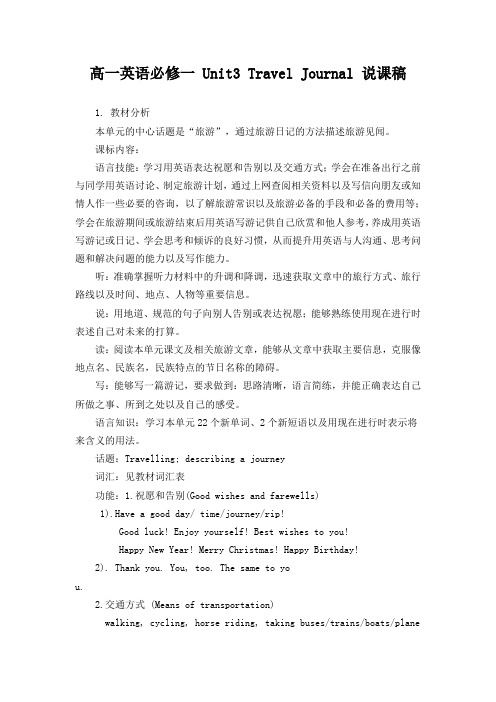
高一英语必修一 Unit3 Travel Journal 说课稿1. 教材分析本单元的中心话题是“旅游”,通过旅游日记的方法描述旅游见闻。
课标内容:语言技能:学习用英语表达祝愿和告别以及交通方式;学会在准备出行之前与同学用英语讨论、制定旅游计划,通过上网查阅相关资料以及写信向朋友或知情人作一些必要的咨询,以了解旅游常识以及旅游必备的手段和必备的费用等;学会在旅游期间或旅游结束后用英语写游记供自己欣赏和他人参考,养成用英语写游记或日记、学会思考和倾诉的良好习惯,从而提升用英语与人沟通、思考问题和解决问题的能力以及写作能力。
听:准确掌握听力材料中的升调和降调,迅速获取文章中的旅行方式、旅行路线以及时间、地点、人物等重要信息。
说:用地道、规范的句子向别人告别或表达祝愿;能够熟练使用现在进行时表述自己对未来的打算。
读:阅读本单元课文及相关旅游文章,能够从文章中获取主要信息,克服像地点名、民族名,民族特点的节日名称的障碍。
写:能够写一篇游记,要求做到:思路清晰,语言简练,并能正确表达自己所做之事、所到之处以及自己的感受。
语言知识:学习本单元22个新单词、2个新短语以及用现在进行时表示将来含义的用法。
话题:Travelling; describing a journey词汇:见教材词汇表功能:1.祝愿和告别(Good wishes and farewells)1).Have a good day/ time/journey/rip!Good luck! Enjoy yourself! Best wishes to you!Happy New Year! Merry Christmas! Happy Birthday!2). Thank you. You, too. The same to you.2.交通方式 (Means of transportation)walking, cycling, horse riding, taking buses/trains/boats/plane语法:现在进行时表示将来When are you leaving?How are you going there?Where are you staying?How long are you staying there?When are you coming back?情感态度和价值观:通过课文的学习,要求同学们能够积极参与关于旅行准备、旅游见闻、旅游感受等方面的交流活动,用准确的英语描述国内外的重要景观、名胜古迹以及一些当地的旅游文化节日。
高一英语教案(说课稿):人教版必修一Unit3 Journey down the Mekong
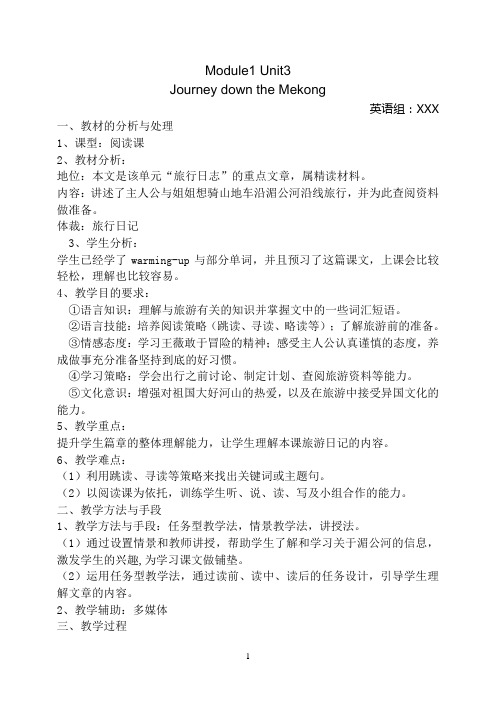
Module1 Unit3Journey down the Mekong英语组:XXX一、教材的分析与处理1、课型:阅读课2、教材分析:地位:本文是该单元“旅行日志”的重点文章,属精读材料。
内容:讲述了主人公与姐姐想骑山地车沿湄公河沿线旅行,并为此查阅资料做准备。
体裁:旅行日记3、学生分析:学生已经学了warming-up与部分单词,并且预习了这篇课文,上课会比较轻松,理解也比较容易。
4、教学目的要求:①语言知识:理解与旅游有关的知识并掌握文中的一些词汇短语。
②语言技能:培养阅读策略(跳读、寻读、略读等);了解旅游前的准备。
③情感态度:学习王薇敢于冒险的精神;感受主人公认真谨慎的态度,养成做事充分准备坚持到底的好习惯。
④学习策略:学会出行之前讨论、制定计划、查阅旅游资料等能力。
⑤文化意识:增强对祖国大好河山的热爱,以及在旅游中接受异国文化的能力。
5、教学重点:提升学生篇章的整体理解能力,让学生理解本课旅游日记的内容。
6、教学难点:(1)利用跳读、寻读等策略来找出关键词或主题句。
(2)以阅读课为依托,训练学生听、说、读、写及小组合作的能力。
二、教学方法与手段1、教学方法与手段:任务型教学法,情景教学法,讲授法。
(1)通过设置情景和教师讲授,帮助学生了解和学习关于湄公河的信息,激发学生的兴趣,为学习课文做铺垫。
(2)运用任务型教学法,通过读前、读中、读后的任务设计,引导学生理解文章的内容。
2、教学辅助:多媒体三、教学过程Step1: Lead inAsk some students to present their dialogue.(The homework of last class)【设计说明】采用对话形式导入,营造出宽松的学习气氛,为学生全面的课堂参与作了铺垫。
Step2: Pre-readingShow students some pictures and maps to know more about the Mekong river, its two names and the route it flows out of China.1. Names: Lancang River and Mekong River2. Route: China-Myanmar-Laos-Thailand-Cambodia-Vietnam-South China sea 【设计说明】利用图片来了解湄公河,为课文第三段做铺垫,同时,激发了学生的兴趣和好奇心。
人教版英语必修一Unit 3(Reading:Journey down the Mekong)教案
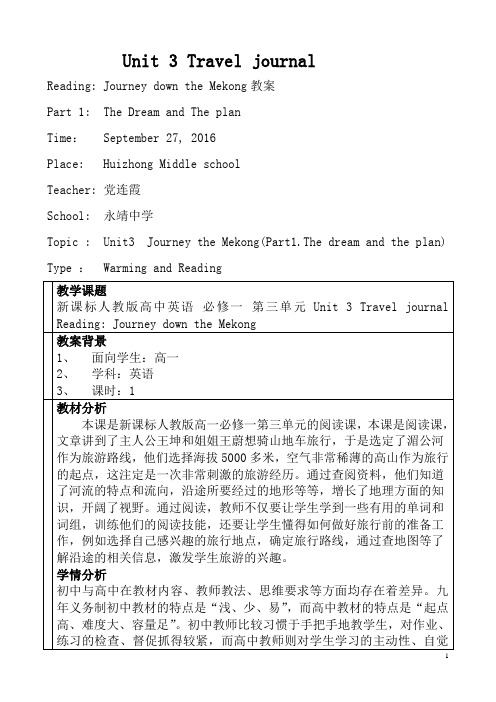
Reading: Journey down the Mekong教案
Part 1:The Dream and The plan
Time:September 27,2016
Place:HuizhongMiddle school
Teacher:党连霞
School:永靖中学
Para. 3The preparations before the trip & details about theMekongRiver.
•Who are Wang Kun and Wang Wei?
•What is their dream?
。Who are Dao Wei and Yu Hang?
4.Sometimes, the river becomes a ________ and enters ____ ______.
5.At last, the river _____ enters the South China Sea.
6.If you travel with them ,you will see all the following except
A. desert B. a waterfall
C. a delta D. a glacier
通过skimming及scanning阅读策略,引领学生关注文本的主题及涉及主题的主要信息。(也是这节课的重点和难点)
Step 4:Summary
Wang Wei and ____.___ have dreamed about ____ a great ___ ___.It was Wang Wei who first had the idea to ____ along the entireMekongRiver. My sister doesn’t ___________ details, because she doesn’t know the best way of getting to places.
高中英语_Unit3 Sports and Fitness教学设计学情分析教材分析课后反思
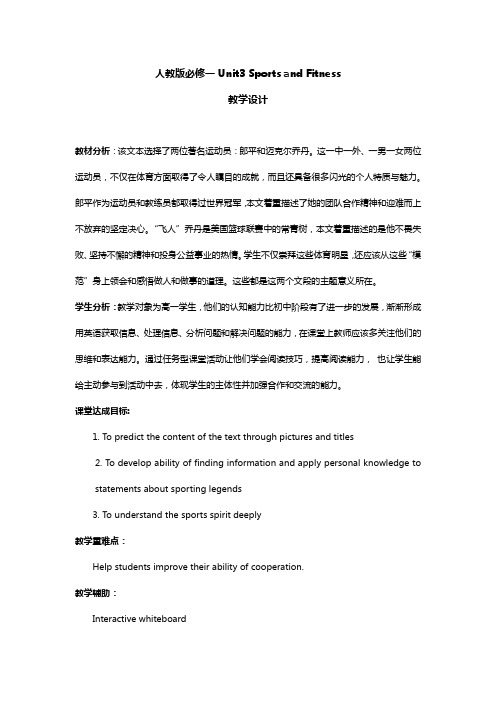
人教版必修一Unit3 Sports and Fitness教学设计教材分析:该文本选择了两位著名运动员:郎平和迈克尔乔丹。
这一中一外、一男一女两位运动员,不仅在体育方面取得了令人瞩目的成就,而且还具备很多闪光的个人特质与魅力。
郎平作为运动员和教练员都取得过世界冠军,本文着重描述了她的团队合作精神和迎难而上不放弃的坚定决心。
“飞人”乔丹是美国篮球联赛中的常青树,本文着重描述的是他不畏失败、坚持不懈的精神和投身公益事业的热情。
学生不仅崇拜这些体育明星,还应该从这些“模范”身上领会和感悟做人和做事的道理。
这些都是这两个文段的主题意义所在。
学生分析:教学对象为高一学生,他们的认知能力比初中阶段有了进一步的发展,渐渐形成用英语获取信息、处理信息、分析问题和解决问题的能力,在课堂上教师应该多关注他们的思维和表达能力。
通过任务型课堂活动让他们学会阅读技巧,提高阅读能力,也让学生能给主动参与到活动中去,体现学生的主体性并加强合作和交流的能力。
课堂达成目标:1. T o predict the content of the text through pictures and titles2. To develop ability of finding information and apply personal knowledge tostatements about sporting legends3. T o understand the sports spirit deeply教学重难点:Help students improve their ability of cooperation.教学辅助:Interactive whiteboard教学过程:Step 1 Lead-inA guessing gameShow brief introductions of four famous athletes. Students should guess their names.【设计意图】根据英文提示猜人物的游戏激发学生的好奇心,成功引出主题“Living Legends of Sports”。
高中英语:Unit3《Celebration》教案(北师大版必修1)

Unit 3 Festivals一、教材分析1.本课所在的单元的主题Celebration(庆祝)主要是介绍了中外的一些主要的节日,还介绍了人们在一些特殊日子里的庆祝活动。
2.本课Chinese Seasonal Festivals 是本单元的第一课,是一节阅读课。
3.在Warm-up 部分学生通过听力理解已了解了一些关于庆祝的内容及相关词汇,为本课的话题作了一些词汇和内容的铺垫。
4.本课要通过阅读文章被动语态的用法。
二、学生分析1.学生在Warm-up 部分通过听力理解已了解了一些关于庆祝的内容及相关词汇以。
2.学生对本课话题Chinese Seasonal Festivals 已初步具备了一定的背景知识、经历和经验,但是要用英语表达出来还是有一定的难度。
3.高一的学生已初步具备了一定的从语言材料中获取相关语言信息的能力。
三、教学目标基于《课程标准》:“注重提高学生用英语进行思维和表达的能力;形成跨文化交际意识和基本跨文化交际能力.”这一基本要求,达到下列教学目标:1.知识教学点使学生了解和掌握下列知识目标:1)进一步了解我国的一些主要的节日及相关的历史。
2)掌握从文章中获取和处理主要的信息的方法和技巧。
3)掌握介绍节日的基本的篇章结构。
4)学会用英语简单介绍中国的节假日。
使学生掌握下列单词及短语。
(walk along...,take the...turning on the left,catch a bus,need a number 16 bus,I's about a hundred meters along on the right/left)2.教学目标设计A. 语言知识目标:使学生掌握下列单词及短语。
(walk along...,take the...turning on the left,catch a bus,need a number 16 bus,I's about a hundred meters along on the right/left) B.语言技能目标:使学生掌握问路及应答的方法,介绍从家到学校的路线,并能较熟练地指明长春市各大旅游景点的乘车路线。
高一英语必修一unit3教案
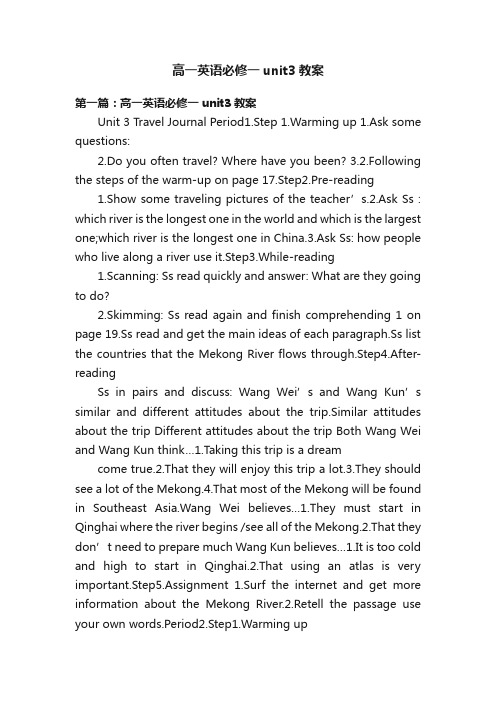
高一英语必修一unit3教案第一篇:高一英语必修一unit3教案Unit 3 Travel Journal Period1.Step 1.Warming up 1.Ask some questions:2.Do you often travel? Where have you been?3.2.Following the steps of the warm-up on page 17.Step2.Pre-reading1.Show some traveling pictures of the teacher’s.2.Ask Ss : which river is the longest one in the world and which is the largest one;which river is the longest one in China.3.Ask Ss: how people who live along a river use it.Step3.While-reading1.Scanning: Ss read quickly and answer: What are they going to do?2.Skimming: Ss read again and finish comprehending 1 on page 19.Ss read and get the main ideas of each paragraph.Ss list the countries that the Mekong River flows through.Step4.After-readingSs in pairs and discuss: Wang Wei’s and Wang Kun’s similar and different attitudes about the trip.Similar attitudes about the trip Different attitudes about the trip Both Wang Wei and Wang Kun think…1.Taking this trip is a dreamcome true.2.That they will enjoy this trip a lot.3.They should see a lot of the Mekong.4.That most of the Mekong will be found in Southeast Asia.Wang Wei believes…1.They must start in Qinghai where the river begins /see all of the Mekong.2.That they don’t need to prepare much Wang Kun believes…1.It is too cold and high to start in Qinghai.2.That using an atlas is very important.Step5.Assignment 1.Surf the internet and get more information about the Mekong River.2.Retell the passage use your own words.Period2.Step1.Warming upAsk some Ss to retell the passage that they have learnt last period.Step2.Learning about the languageTeacher explains some language points in the text on page 18.1.Persuade sb.into /out of sth.: cause sb.(not)to do sth.by arguing or reasoning with him 说服或劝说某人(不)做某事He is easily persuaded.Wang Kun couldn’t persuade his sister to change her mind.persuade sb.(that clause): cause sb.to believe sth.;convince sb.使某人信服How can I persuade you that I am telling the truth?2.insist(v.): demand(sth)forcefully, not accepting a refusal 坚持或坚决要求;eg.Since he insisted, I had to stay.insist on sth/doing sth: require or demand;refuse to accept an alternative 一定要(某事物),坚决主张She insists on getting up early and playing her radio loud.3.care about: be worried, concerned or interested 忧虑,关心,惦念don’t you care about anybody? I don’t care about what happens to him.care for /to do: be willing or agree to do sth.;wish or like to do sth.Would you care a drink? Would you care to go for a walk? care for sb.1).Like or love sb.He cares for her deeply.2).Look after sb;take care of sb;be responsible for sb Who will care for your child if you are out?4.Once she has made up her mind, nothing can change it.她一旦下了决心,什么也不能使她改变。
选择性必修第一册教案unit 3
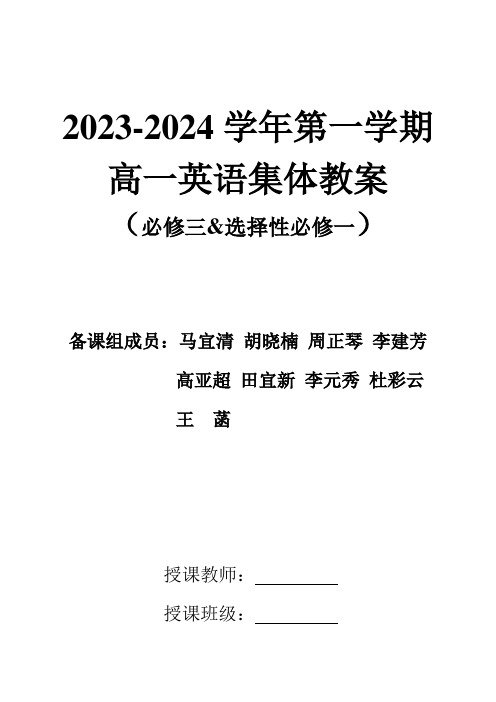
2023-2024学年第一学期高一英语集体教案
(必修三&选择性必修一)
备课组成员:马宜清胡晓楠周正琴李建芳
高亚超田宜新李元秀杜彩云
王菡
授课教师:
授课班级:
Book 1 Unit 3 Conservation
【单元教材分析】
本单元主题语境是“人与自然”,涉及的主题语境内容是环境保护,最终实现人与自然和谐相处。
本单元从听Linda Wei的讲座开始,引入塑料袋对环境的污染,然后又依次讲到犀牛的保护、物种灭绝的原因、后果和对策、Kevin和Alicia对塑料袋包装是否污染的讨论、英国的交通问题及对策以及工厂化养殖的利弊,帮助学生全面了解现阶段存在的人与自然不和谐相处的现状,使学生意识到保护环境,实现人与自然和谐相处的重要性,引导学生提高环保意识,为建设环境友好型社会做贡献。
【单元学习目标】
1.语言能力目标
能够理解人与自然相关的文章内容,听懂并谈论保护环境相关的话题,恰当使用所学词汇、句型描述环境问题和解决对策;能够通过议论文表达自己的观点和看法;能够为保护环境,保护动物提出合理的建议。
2.文化意识目标
能够通过了解人与自然不和谐相处的现状,树立正确的环保意识,为保护环境做贡献。
3.思维品质目标
能够通过比较、分析,准确获取语篇中有关环保问题和解决对策的相关信息,建立对人与自然关系的正确认识,并在此基础上联系自身实际,对环保问题表达自己的见解,提高环保意识,实现知识与思维能力的迁移。
4.学习能力目标
能够通过了解人与自然相处的现状,激发英语学习的兴趣;能够多渠道获取英语学习资源;能够选择恰当的策略与方法,监控、评价、反思和调整自己的学习内容和进程。
牛津译林版高一英语必修一教案unit3
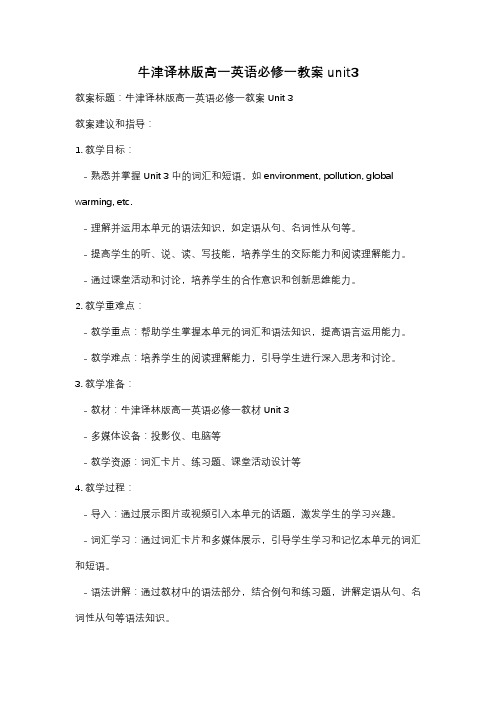
牛津译林版高一英语必修一教案unit3教案标题:牛津译林版高一英语必修一教案Unit 3教案建议和指导:1. 教学目标:- 熟悉并掌握Unit 3中的词汇和短语,如environment, pollution, global warming, etc.- 理解并运用本单元的语法知识,如定语从句、名词性从句等。
- 提高学生的听、说、读、写技能,培养学生的交际能力和阅读理解能力。
- 通过课堂活动和讨论,培养学生的合作意识和创新思维能力。
2. 教学重难点:- 教学重点:帮助学生掌握本单元的词汇和语法知识,提高语言运用能力。
- 教学难点:培养学生的阅读理解能力,引导学生进行深入思考和讨论。
3. 教学准备:- 教材:牛津译林版高一英语必修一教材Unit 3- 多媒体设备:投影仪、电脑等- 教学资源:词汇卡片、练习题、课堂活动设计等4. 教学过程:- 导入:通过展示图片或视频引入本单元的话题,激发学生的学习兴趣。
- 词汇学习:通过词汇卡片和多媒体展示,引导学生学习和记忆本单元的词汇和短语。
- 语法讲解:通过教材中的语法部分,结合例句和练习题,讲解定语从句、名词性从句等语法知识。
- 阅读理解:选择教材中的一篇阅读材料,设计问题和讨论活动,引导学生进行阅读理解和思考。
- 交流活动:设计小组讨论或角色扮演活动,让学生在小组内进行合作交流,分享自己的观点和想法。
- 语言运用:通过练习题和语言游戏,巩固学生对本单元词汇和语法的运用能力。
- 总结归纳:对本节课的重点内容进行总结和归纳,帮助学生理清思路和加深记忆。
- 作业布置:布置相关的作业,如课后练习题、写作任务等,巩固学生的学习成果。
5. 教学评估:- 通过课堂讨论、练习题和作业的批改,对学生的学习情况进行评估和反馈。
- 鼓励学生积极参与课堂活动,提高学生的学习兴趣和主动性。
6. 教学延伸:- 鼓励学生进行相关的课外阅读和研究,拓宽知识面和培养学生的自主学习能力。
英语必修一unit3教案
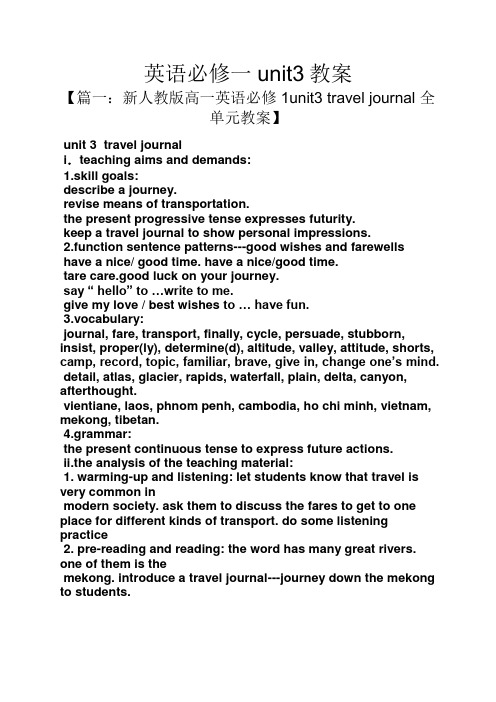
英语必修一unit3教案【篇一:新人教版高一英语必修1unit3 travel journal 全单元教案】unit 3 travel journali.teaching aims and demands:1.skill goals:describe a journey.revise means of transportation.the present progressive tense expresses futurity.keep a travel journal to show personal impressions.2.function sentence patterns---good wishes and farewellshave a nice/ good time. have a nice/good time.tare care.good luck on your journey.say “ hello” to …write to me.give my love / best wishes to … have fun.3.vocabulary:journal, fare, transport, finally, cycle, persuade, stubborn, insist, proper(ly), determine(d), altitude, valley, attitude, shorts, camp, record, topic, familiar, brave, give in, change one’s mind. detail, atlas, glacier, rapids, waterfall, plain, delta, canyon, afterthought.vientiane, laos, phnom penh, cambodia, ho chi minh, vietnam, mekong, tibetan.4.grammar:the present continuous tense to express future actions.ii.the analysis of the teaching material:1. warming-up and listening: let students know that travel is very common inmodern society. ask them to discuss the fares to get to one place for different kinds of transport. do some listening practice2. pre-reading and reading: the word has many great rivers. one of them is themekong. introduce a travel journal---journey down the mekong to students.3.learning about language: in this part, students will discover useful words and expressions and also learn useful structures---- the present continuous tense to express future actionsing language: present how to write a travel journal and then practise writing iii.teaching arrangment1stperiod 2nd period 3rd period 4thperiodwarming-up and listening reading learn about languageusing languagethe first period warming-up and listeningteaching aims1. to talk about things related to travel, e.g. the place the fares and transport, etc.2. to improve the ss’ listening ability.teaching important points1. to talk about travel.2. to tell the ss how to catch the key points when they do listening.emotion goals:there are so many beautiful places in china and the whole world. we should love our country, love the whole world and love nature.teaching aidsa tape recorder, a projector and a computerstep 1. a song (歌词见后面)step 2 warming upshow the photos of some beautiful places on the powerpoint. (the great wall; yuanming yuan ; budala palace; venice; the liberty statue in new york,america; fujiyama.)ask students whether they know where they are.then t ask: do you like traveling? ss: yest: why do you like traveling? (超级链接):enjoy beautiful scenery; increase our knowledge; make friends; be good to health…ss may have a lot of different ideas. give them time to talk freely.t ask: how will you prepare for traveling? (including the time, the place, the means, the cost, the things you’ll take along, … of traveling) (超级链接) :1. time (超级链接):the spring festival; national day; may day; weekend; summer( winter) vacation…2.destination(超级链接): enjoy some beautiful pictures of famous places with the whole class: huangshan黄山; jiuzhaigou九寨沟; guilin桂林; stone forest(石林); jiuquxi(九曲溪; yunufeng,wuyi(武夷玉女峰); sanqing mountain三清山; hangzhou;longmen caves (龙门石窟);tian’anmen square(天安门广场);terracotta,xi’an(西安兵马俑); summer palace(颐和园); london bridge;the opera house悉尼歌剧院; eiffel tower艾菲尔铁塔.3.what to do(超级链接): rock climbing; rafting; bengee; skiing; hikingallow the ss to talk more about it.4.travel cost: talk with the ss quickly.5.things to take(超级链接): id cards(身份证) passports; money (cash); a book of maps; 等。
新人教版高一英语必修一第一册 Unit 3 教案
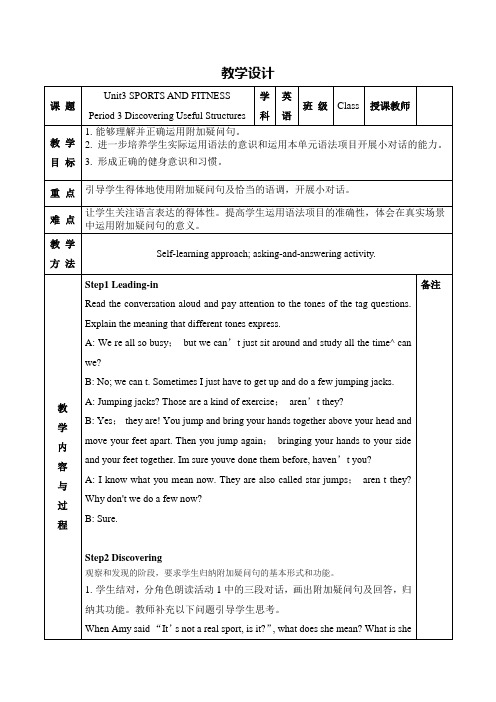
引导学生得体地使用附加疑问句及恰当的语调,开展小对话。
难点
让学生关注语言表达的得体性。提高学生运用语法项目的准确性,体会在真实场景中运用附加疑问句的意义。
教学方法
Self-learning approach; asking-and-answering activity.
教
学
内
容
与
过
程
Step1 Leading-in
When is your birthday?
What do you have for breakfast?
What is your favourite sport?
What sports events have you been to?
Can you ski?
3. Ask students to add a few more questions.
4. As a warm-up activity, have students ask each other the questions in pairs,
swapping pairs a few times.
5. Model the activity with a student first.Tell students not to write down any of the answers, and continue with your class on tag questions.
1. So the other girl won, did she?(根据语境,可以表示兴趣)
2. Oh, you’ve made another mistake, have you?(根据语境,可以表示愤怒)
高一英语必修1unit3 reading教案

教学重点:(1)理解课文,理解本课中所出现的新词的用法。
(2)通过语篇学习,掌握旅游日记的内容,培养阅读技能。
(3)让学生学会用英语交流旅游计划,谈论旅游话题。
教学难点:(1) 识记关于地形地貌的名词。
(2) 在充分阅读的基础上,对课文进行复述和表达自己的观点。
(3)让学生学会利用略读、查读等阅读技巧来确定关键词、主题句、形成阅读策略。
3)让学生猜测故事的主人公在旅行途中会有什么样的见闻,提问:What words or information do you think will be included in the reading passage?
Some students’ answers may not be completed because some may not know much about theMekong.
教学目标
1.语言知识目标
(1)掌握阅读课文中出现的新词汇和课文中的黑体字;体会现在进行时表达将来动作的用法。
(2)了解旅游所需的准备工作,其中包括精神与物质准备;选择旅游时间、景点、路线、交通工具(火车、汽车、轮船、飞机、自行车等);掌握旅游常识,学会解决旅游中出现的一些问题;说出一些关于地形地貌的名词。
(4)如何帮助学生运用阅读策略,促进学生自主学习。
教学过程
教学环节
教师活动
预设学生行为
设计意图
1. Lead –in
1.Show students some pictures of a river.
2.Discuss two questions:
1)Would you like to travel along a river to appreciate its scenery?
人教高一英语必修一unit3优秀教案
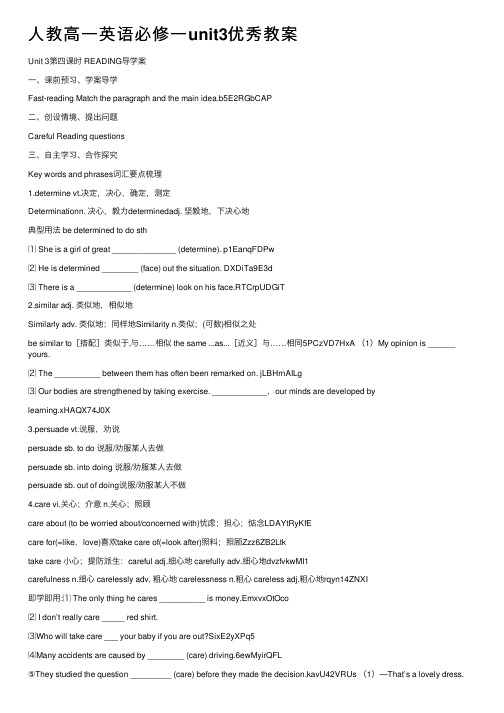
⼈教⾼⼀英语必修⼀unit3优秀教案Unit 3第四课时 READING导学案⼀、课前预习、学案导学Fast-reading Match the paragraph and the main idea.b5E2RGbCAP⼆、创设情境、提出问题Careful Reading questions三、⾃主学习、合作探究Key words and phrases词汇要点梳理1.determine vt.决定,决⼼,确定,测定Determinationn. 决⼼,毅⼒determinedadj. 坚毅地,下决⼼地典型⽤法 be determined to do sth⑴ She is a girl of great ______________ (determine). p1EanqFDPw⑵ He is determined ________ (face) out the situation. DXDiTa9E3d⑶ There is a ____________ (determine) look on his face.RTCrpUDGiT2.similar adj. 类似地,相似地Similarly adv. 类似地;同样地Similarity n.类似;(可数)相似之处be similar to[搭配]类似于,与……相似 the same ...as...[近义]与……相同5PCzVD7HxA (1)My opinion is ______ yours.⑵ The __________ between them has often been remarked on. jLBHrnAILg⑶ Our bodies are strengthened by taking exercise. ____________,our minds are developed bylearning.xHAQX74J0X3.persuade vt.说服,劝说persuade sb. to do 说服/劝服某⼈去做persuade sb. into doing 说服/劝服某⼈去做persuade sb. out of doing说服/劝服某⼈不做4.care vi.关⼼;介意 n.关⼼;照顾care about (to be worried about/concerned with)忧虑;担⼼;惦念LDAYtRyKfEcare for(=like,love)喜欢take care of(=look after)照料;照顾Zzz6ZB2Ltktake care ⼩⼼;提防派⽣:careful adj.细⼼地 carefully adv.细⼼地dvzfvkwMI1carefulness n.细⼼ carelessly adv. 粗⼼地 carelessness n.粗⼼ careless adj.粗⼼地rqyn14ZNXI即学即⽤:⑴ The only thing he cares __________ is money.EmxvxOtOco⑵ I don’t really care _____ red shirt.⑶Who will take care ___ your baby if you are out?SixE2yXPq5⑷Many accidents are caused by ________ (care) driving.6ewMyirQFL⑤They studied the question _________ (care) before they made the decision.kavU42VRUs (1)—That’s a lovely dress.—Do you think so?but I don’t thecolor.A.interested inB.care forC.take care ofD.fond of y6v3ALoS89(2)I don’t think Jack what happensto his family.He is so selfish.M2ub6vSTnPA.cares forB.cares aboutC.cares toD.cares of0YujCfmUCw5.attitude n. 态度;看法attitude to/towards ... 对……地态度翻译:我地英语⽼师改变了对我地态度.My English teacher ________________________ me.eUts8ZQVRd has changed his attitude to/towards me.6.be fond of(=love;like)喜欢;喜爱翻译:虽然她有好多缺点,但是我们都很喜欢她.sQsAEJkW5T She has many shortcomings,but we __________________her.GMsIasNXkA四、师⽣互动、引导点拨1.Ever since middle school, my sister WangWei and I have dreamed about taking a great bike trip.TIrRGchYzg1). dream n. v.dream of/about sth. (vi.)dream that… (vt.)dream sb. to be … (vt.)7EqZcWLZNX2. Then she persuade me to buy one.然后她动员我也买了⼀辆.persuade sb. (not) to do sth.=persuade sb. into / out of doing sth.lzq7IGf02E我已说服他做这件事.e.g. I persuaded him to do it.= persuade him into doing it. zvpgeqJ1hk3. It was my sister who first had the idea to cycle along the entire Mekong River from whereit begins to where it ends. 是我姐姐⾸先想到骑⾃⾏车沿湄公河从它地源头⾏⾛到⼊海⼝.NrpoJac3v1 这是⼀个强调句.强调句地结构是:It was/is+强调成分+that-/who-分句. 如果强调地部分是⼈,可⽤who,也可⽤that, 强调其他成分与内容都⽤that.强调时间和地点不能⽤when或where,只⽤that.1nowfTG4KIe. g.我看这部电影是在上海.(强调地点状语)It was in Shanghai that I saw the film. fjnFLDa5Zoe. g ⑴ All the students held ②a meeting③in the classroom④yesterday.tfnNhnE6e5⑴It was all the students that/who held a meeting in the classroom yesterday. HbmVN777sL(强调主语, was不能换⽤were)②It was a meeting that all the students held in the classroom yesterday. V7l4jRB8Hs(强调宾语 a meeting)③It was in the classroom that all the students held a meeting yesterday. 83lcPA59W9(强调地点状语,that不可换⽤ where)④It was yesterday that all the students held a meeting in the classroom. mZkklkzaaP(强调时间状语that不可换⽤ when)把这个句⼦地不同成分改成强调句.John gave Mary a handbag at Christmas.AVktR43bpw⾼考链接1).Was it ___ that I saw last night at the concert?ORjBnOwcEdA. youB. not youC. that yourself2).It was because of bad weather ___ the football match had to be put off.2MiJTy0dTTA. soB. so thatC. whyD. that gIiSpiue7A3).—Who is making so much noise in the garden?—______ the children.A. It isB. They areC. That isD. There are uEh0U1Yfmh4. Although she didn’t know the best way of getting get to places, she insisted that she organize the trip properly. 尽管她不知道旅⾏地最佳⽅式, 但是她还是坚决主张她来合理安排这次旅⾏.IAg9qLsgBX1) although, though引导让步状语从句不能再和but, and, however连⽤,although从句多放在句⾸, though从句可在主句前,中,后任何位置.WwghWvVhPE[考例] ______ he has limited technical knowledge, the old worker has a lot of experience.asfpsfpi4kA. SinceB. UnlessC. AsD. Although ooeyYZTjj12) insist : 坚持认为,坚持主张※insist on/upon one’s doing sth坚持做,坚决做e.g. I insisted on/upon his coming with us.※insist that +从句“坚持说”(后表⽰⼀个事实), 后接地从句⽤陈述语⽓,既按需要选择时态. e.g. He insisted that he hadn’t stolen the girl’s handbag.BkeGuInkxI ※insist that sb. (should) do sth. 坚决主张做某事,后接地宾语从句常⽤虚拟语⽓, 既“should +v.”e.g. Mary was ill. Her parents insisted that she (should) see a doctor.PgdO0sRlMo⾼考链接1). I insisted that a doctor __ immediately.A has been sent for B. sent forC. will be sent for D. be sent for3cdXwckm152).The doctor insisted that I a high fever and that I a rest for a few days. A.had;hadB.have;haveC.had;haveD.have;had h8c52WOngM3).The man insisted a taxi for me even if/though I told him I lived nearby.v4bdyGiousA.findB.to findC.on findingD.in finding5. My sister doesn’t care about details. 我姐姐是不会考虑细节地.J0bm4qMpJ9care about: be worried about忧虑,关⼼e.g. 他并不关⼼我地事情.He doesn’t care much about what happens to me.care for sb/sth: look after, love or like希望, 喜欢, 照顾XVauA9grYP1) He cares for her deeply.2) Who will care for your child if you are out?6. She gave me a determined look –the kind that she wouldn’t change her mind.bR9C6TJscw 她坚定地看了我⼀眼----这眼神表明她不会改变主意.determine v. 决定, 下定决⼼, 确定 determine to do sth. =make u p one’s mind 下定决⼼pN9LBDdtrd e.g. He determined to learn French. be determined to do sth. 决⼼做DJ8T7nHuGTe.g. She was determined to go to university.change one’s mind 改变某⼈地主意e.g. No matter what you say, I won’t change my mind.QF81D7bvUA7.at an altitude of = at a height of 在海拔……⽶处e.g. The plane is flying at a height / altitude of 10,000 feet.4B7a9QFw9h8. When I told her the air would be hard to breath and it would be very cold…ix6iFA8xoX当我告诉她将呼吸困难, 天⽓严寒……主语 + be + adj.+ to do sth. 是⼀常⽤句式既不定式⽤主动形式表达被动含义e.g. The problem is really hard to work out.My boss is easy to deal with.这类形容词有surprised, moved, disappointed, pleased, happy, sad, delighted, sorry, interested, glad, worried,etc.wt6qbkCyDE9. Finally, I had to give in. 最后, 我只好让步. give in (to sb./sth.) 屈服于, 让步, 递交Kp5zH46zRke.g. He had to give in to my views.\\ It’s time you gave in your papers.Yl4HdOAA61give up 放弃, 认输 ; give out 筋疲⼒尽;分配; ;give away 捐赠, 泄露ch4PJx4BlI练⼀练1) After the long trip, both the men and the horses ________.qd3YfhxCzo2) Because of his small salary, he had to _______ his dream trip to Europe.E836L11DO53) Seeing that he could not persuade me, he had to ___________ my view.S42ehLvE3M4) He _________ most of his fortune to the poor.5) Please keep the secret, don’t ____ it _____.思路点拨:gave out; gave up;gave in to ; gave away ; gave away501nNvZFis※ give in (sth. to sb.)屈服让步上交1) He would rather die than give in.2) Wang Kun had to give in because he knew his sister well.jW1viftGw93) Please give your examination papers in ( to the teacher) when you’ve finished.xS0DOYWHLP 选择题---Smoking is bad for your health ---Yes,I know. But I simply can’t ___.LOZMkIqI0wA. give it upB. give it outC. give it inD. give it away ZKZUQsUJed10. It becomes rapids as it passes through deep valleys, traveling across dGY2mcoKtTwestern Yunnan Province穿过深⾕流经云南省西部时它变成急流.词汇辨析: Across;through ; over prep. 穿过across 常表⽰从⼀定范围地⼀边到另⼀边或事物交叉位置, “横穿, 横跨”表⾯, 含义与on 有关rCYbSWRLIAthrough 表达两边穿过或穿过空间内部, 含义与in 有关over表⽰“越过”是指越过较⾼地物体从⼀侧到另⼀侧e.g. She swam ________the river.The river flows _________the city from west to east. FyXjoFlMWhWalk _______the square and go _________the gate, then you’ll come to the cafe. TuWrUpPObX The thief climbed______the wall and ran away.across ; through ;across ; through ;over实例:The new railway winds its way to Hong Kong, ___ mountains ___ tunnels and ___ rivers.7qWAq9jPqEA.across; over; throughB. over; across; . through llVIWTNQFkC. over; through; acrossD. through; over; across yhUQsDgRT1五、巩固练习、拓展提⾼A.写出下列单词地正确形式:1. He is planning his work _______ (进度表) for the following week.MdUZYnKS8I2. They took many pictures of the _________ (瀑布) yesterday.09T7t6eTno3. What is the ______ (海拔) of this mountain?4. I think you don’t know your own ___________. In fact, no one is perfect.e5TfZQIUB55. He is so s________ that nobody can change his mind.s1SovAcVQM6. Do you know where the s______ of the Changjiang River is?GXRw1kFW5s7.We are looking for someone who is (可靠地) and hard-working.UTREx49Xj98.We tried to p him to give up smoking,but he just wouldn’t listen.8PQN3NDYyP9.Though with great difficulty,I finished all my work f .mLPVzx7ZNw10.Excuse me,what is the f to London?Is $5 enough? AHP35hB02d11.The captain kept a j when he was at sea.He wrote down everything that happened.NDOcB141gT12.Your main d is your lack of job experience.1zOk7Ly2vA点拨:1.Schedule;2.waterfall;3.altitude;4.shortcomings;5.stubborn;6.source;fuNsDv23Kh7.Reliable; 8.persuade; 9.finally; 10.fare ; 11.journal ; 12.disadvantage tqMB9ew4YXB.课⽂原⽂重点句型再现1.Two years ago she bought an expensive mountain bike and then she persuaded me to buy oneHmMJFY05dE2. It was my sister who first had the idea to cycle along the entire Mekong River ViLRaIt6sk from where it begins to where it ends.3. Although she didn’t know the best way of getting to places,she insisted that she 9eK0GsX7H1 organize the trip properly.4.When I told her that our journey would begin at an altitude of more than 5,000 metres,naK8ccr8VIshe seemed to be excited about it.5.It makes wide bends or meanders through low valleys to the plains rice grows.B6JgIVV9aoC.⾼考连接【例1】The CDs are on sale!Buy one and youget completely free. (全国Ⅱ⾼考)P2IpeFpap5 A.other B.others C.one D.ones【例2】—I’ve read another book this week.—Well,maybe is not how much you read but what you read that counts.(浙江⾼考)3YIxKpScDM A.this B.that C.there D.it 【例3】 the police thought he was themost likely one,since they had no exact gUHFg9mdSsproof about it,they could not arrest him. (湖南⾼考)A.AlthoughB.As long asC.If onlyD.As soon as uQHOMTQe79D. 词组识记/英汉互译1. take a great bike trip 11. ⼭地车2. give me a determined look 12. 与…相似IMGWiDkflP3. change one’s mind 13.下决⼼做某事WHF4OmOgAw4. give in /give up5.make up one’s mind 14. 在海拔5000多⽶处aDFdk6hhPd6. have an idea 16. 沿着湄公河从源头骑车⾄终点ozElQQLi4T7. be fond of 17. 梦想做某事CvDtmAfjiA8. as usual 18. 说服某⼈做某事QrDCRkJkxh9. ever since10.care for版权申明本⽂部分内容,包括⽂字、图⽚、以及设计等在⽹上搜集整理.版权为个⼈所有This article includes some parts, including text, pictures, and design.Copyright is personal ownership.4nCKn3dlMX⽤户可将本⽂地内容或服务⽤于个⼈学习、研究或欣赏,以及其他⾮商业性或⾮盈利性⽤途,但同时应遵守著作权法及其他相关法律地规定,不得侵犯本⽹站及相关权利⼈地合法权利.除此以外,将本⽂任何内容或服务⽤于其他⽤途时,须征得本⼈及相关权利⼈地书⾯许可,并⽀付报酬.ijCSTNGm0EUsers may use the contents or services of this article for personal study, research or appreciation, and other non-commercial or non-profit purposes, butat the same time, they shall abide by the provisions of copyright law and otherrelevant laws, and shall not infringe upon the legitimate rights of this website and its relevant obligees. In addition, when a ny content or service of this article is used for other purposes, written permission and remuneration shall be obtained from the person concerned and the relevant obligee.vfB1pxanfk转载或引⽤本⽂内容必须是以新闻性或资料性公共免费信息为使⽤⽬地地合理、善意引⽤,不得对本⽂内容原意进⾏曲解、修改,并⾃负版权等法律责任.JbA9VhEou1 Reproduction or quotation of the content of this article must be reasonableand good-faith citation for the use of news or informative public free information. It shall not misinterpret or modify the original intention of the content of this article, and shall bear legal liability such as copyright.X7Ahr18pJI。
外研版高一英语必修第一册(2019版)_Unit3_Starting_out_and_U名师教学设计
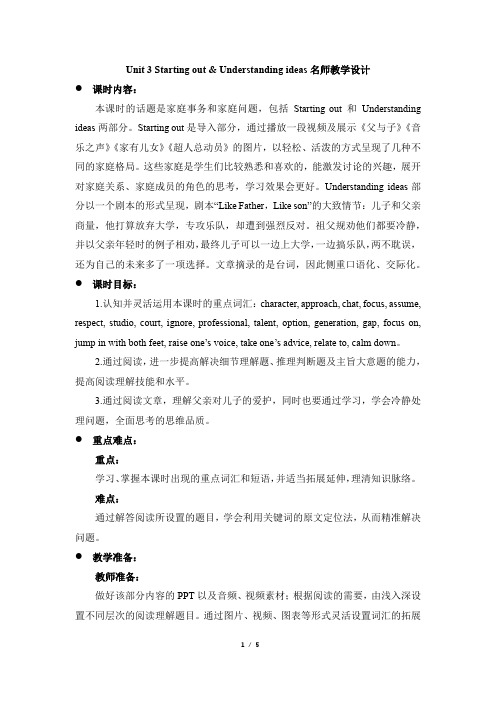
Unit 3 Starting out & Understanding ideas名师教学设计●课时内容:本课时的话题是家庭事务和家庭问题,包括Starting out和Understanding ideas两部分。
Starting out是导入部分,通过播放一段视频及展示《父与子》《音乐之声》《家有儿女》《超人总动员》的图片,以轻松、活泼的方式呈现了几种不同的家庭格局。
这些家庭是学生们比较熟悉和喜欢的,能激发讨论的兴趣,展开对家庭关系、家庭成员的角色的思考,学习效果会更好。
Understanding ideas部分以一个剧本的形式呈现,剧本“Like Father,Like son”的大致情节:儿子和父亲商量,他打算放弃大学,专攻乐队,却遭到强烈反对。
祖父规劝他们都要冷静,并以父亲年轻时的例子相劝,最终儿子可以一边上大学,一边搞乐队,两不耽误,还为自己的未来多了一项选择。
文章摘录的是台词,因此侧重口语化、交际化。
●课时目标:1.认知并灵活运用本课时的重点词汇:character, approach, chat, focus, assume, respect, studio, court, ignore, professional, talent, option, generation, gap, focus on, jump in with both feet, raise one’s voice, take one’s advice, relate to, calm down。
2.通过阅读,进一步提高解决细节理解题、推理判断题及主旨大意题的能力,提高阅读理解技能和水平。
3.通过阅读文章,理解父亲对儿子的爱护,同时也要通过学习,学会冷静处理问题,全面思考的思维品质。
●重点难点:重点:学习、掌握本课时出现的重点词汇和短语,并适当拓展延伸,理清知识脉络。
难点:通过解答阅读所设置的题目,学会利用关键词的原文定位法,从而精准解决问题。
Unit 3 Looking good, feeling good(译林牛津版高一英语必修一教案教学
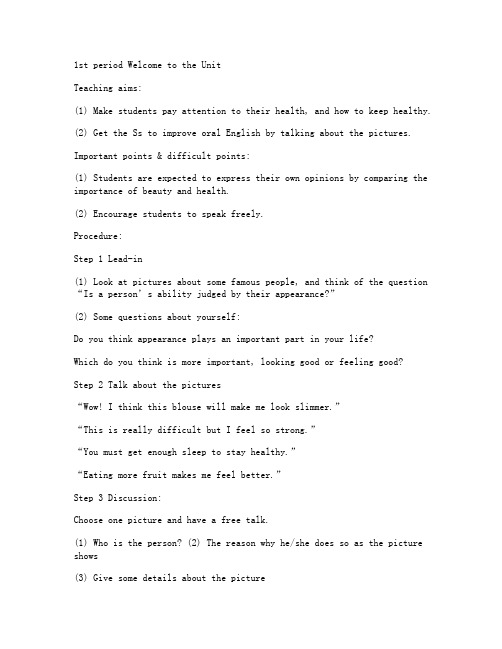
1st period Welcome to the UnitTeaching aims:(1) Make students pay attention to their health, and how to keep healthy.(2) Get the Ss to improve oral English by talking about the pictures.Important points & difficult points:(1) Students are expected to express their own opinions by comparing the importance of beauty and health.(2) Encourage students to speak freely.Procedure:Step 1 Lead-in(1) Look at pictures about some famous people, and think of the question “Is a person’s ability judged by their appearance?”(2) Some questions about yourself:Do you think appearance plays an important part in your life?Which do you think is more important, looking good or feeling good?Step 2 Talk about the pictures“Wow! I think this blouse will make me look slimmer.”“This is really difficult but I feel so strong.”“You must get enough sleep to stay healthy.”“Eating more fruit makes me feel better.”Step 3 Discussion:Choose one picture and have a free talk.(1) Who is the person? (2) The reason why he/she does so as the picture shows(3) Give some details about the picture(An example: Jane is a high school student and she is extremely happy, because she has been admitted to university. Tonight her parents will hold a party to celebrate her success and achievements. All theirfriends and relatives are invited to share her happiness. However, now she is at a loss about the clothes she is going to wear tonight. She is confident about everything except her weight. She always worries about being too fat. At this moment, she has spent at least half an hour selecting clothes without success.)Step4 Talk about questions on P41(1) Do you think we can change our appearance by wearing different clothes?(2) Which do you think is more important, eating well or doing exercises?(3) What do you do to keep yourself looking good and feeling good?Step 5 Further discussion:Looking good Feeling goodAdvantagesDisadvantagesStep 6 Homework(1) Preview the reading text.(2) Choose one picture on P41, and write down the details about it.2nd period ReadingTeaching aims:(1) Encourage the Ss to grasp the main topics of the three letterswritten by two good friends---Amy’s problems, how she dealt with it and Zhou Ling’s concerns and advice to Amy.(2) Stimulate the Ss’ interest in lea rning English by talking abouttheir own opinions when itcomes to the topic “To be beautiful or to be healthy ”.Important points & difficult points:(1) Find the main points in the three letters and express them.(2) Understanding the text.Procedure:Step 1 Lead-in(1) Some people are overweight, some are a little fat, and some are slim. Find why people are fat.(2) Discuss ways of losing weight.a) going on a diet b) exercising in the gymc) receiving surgical treatment d) taking weight-loss pills(3) Talk about the advantages, disadvantages & examples of the ways of losing ways.Step 2 Reading comprehension(1) General questions: (1st reading)Where does Amy come from?What kind of pills did Amy take?What caused Amy’s liver to fall?(3) Ex C1 Choose the best answers. (2nd reading)Questions: 1-6Step 3 Further reading(1) Ex C2 Find the main points in the three letters (3rd reading)Subjects Main points1 Dying to be thin2 Recovering3 Re: Recovering(2) Ex D1 D2 Detailed understanding and learning new words in the context.Step 4 Develop reading ability through usage(1) Ex E Complete the letter based on the text.Step 5 Consolidation and Expansion (Choose one of the following.)(1) Suppose you are Amy’s best friend. What advice or suggestions would you give to Amy?(2) Do you think pictures of film stars and models cause young people to worry about their looks? Why or why not?(3) What do you think is the best way to keep healthy? Why?Step 6 HomeworkRead the whole text (1) to know what Amy had to stay slim and how she recovered.(2) to learn some language usages3rd period ReadingTeaching aims:(1) Encourage the Ss to raise reading ability by focusing on language points.(2) Get the Ss to grasp the new language usage in the text by learning them.Important points & difficult points:Language usage:(1) used to do sth be/get used to sth/ doing sth use sth to do sth be used to do sth(2) touching; exciting; moving; disappointing, interesting… (arouse the feeling…)touched; excited; moved; disappointed, interesting… (be made to feel…)Procedure:Step 1 RevisionCheck the language usage in the text(1) words & phrases (2) Non-restrictive attributive clauses (3)‘however/but’ (4) Question tagsStep 2 Language points (Learn and use)(1) I used to go to the g ym three times a week, but I don’t work out any more.used to do sth be/get used to sth/ doing sth use sth to do sth be used to do sth 区别和用法It used to be thought that the Earth was flat, but now everyone knows it is round.Dr Ma used to work in a children’s hospital in Nanjing, usedn’t/didn’t he?I never got used to going to bed so late.Computers are used to do a lot of work in many companies.(2) I used to go to the gym three times a week, but I don’t work out any more.Many famous actors keep fit by working out in the gym every day.The room smelled wonderful but they could not work out where the smell was from.(3) I’m trying to lose weight because I’m so ashamed of my body.be ashamed of sb./sth./doing.../ be ashamed to do.../ be ashamed that…(4) Sin ce I’m preparing to act in a new TV play, I’m taking weight-loss pills called Fat-less, which are quite popular among young women here.Since you have a three-day holiday, why not go to the countryside to enjoy the quiet life there?(5) They contain a harmful chemical that caused my liver to fail. contain / include区别和用法To keep fit, we should always avoid food containing too much fat.The price includes the postage charges.My pet dog has caused me a lot of trouble. What caused him to fall off his horse?(6)This is really a touching story-a stranger who donated part of his liver to a girl he doesn’t even know!The son and his parents are parting at the station with tears in their eyes. What a touching scene!touching; exciting; moving; disappointing, interes ting… (arouse the feeling…)touched; excited; moved; disappointed, interesting… (be made to feel…)The excited children were opening their Christmas presents. (excite)She was deeply moved when she watched the moving film. (move)Step 3 ConsolidationRead the text and find the sentences containing the language usages we have just learned.Step4 Homework(1) A1/A2(P102) (2) B1/B2(P103) (3) Learn the new words by heart.4th period Word powerTeaching aims:(1). Learn and master the new words about sports(2). Enlarge the knowledge about sportImportant points & difficult points:(1). Talk about sports to learn new words(2). Remember some new names of sportsProcedure:Step 1 Lead-inTalk about the 10th National Sports in Nanjing:(1) What have Nanjing people done for the 10th National Sports ?(2) What can I do for this sports meeting?(3) How many kinds of sports can you name ?Free talk about yourself.(1) Of all kinds of sports, which do you like most?(2) Are there any school clubs in your school? Have you ever joined one? If not, are you planning to join one?Step 2 Read and speak(1) Part A on page 46(2) Find all the names of clubsStep 3 Further studyTalk about expressions of the pictures about sports:badminton tennis boxing fencingweightlifting squash shooting volleyballbasketball football aerobics triathlonStep 4 Read and understand(1) Complete the exercise of Part C on page 47.(2) Some questions for you :1) What suggestions does Zhou Ling give to Amy?2) Zhou Ling gives specific advice to Amy about the exercise she can do after the operation: Firstly, if Amy wants to get strong and have some fun with friends,_________________.If Amy just wants to build her strength up by herself, Zhou Ling advises her to__________________.If Amy only wants to have some fun and exercise with some of her friends, she can try_________________.(3) Types of sports Part D (P47)Do you know which are indoor sports and which are outdoor sports? Think more!boxing beach volleyball fencinggymnastics skiing baseball…Step 5. Homework(1) Learn all the new words by heart.(2) Make sure you know how to use it.5th period Grammar and usageTeaching aims:(1) Master the usage of non-restrictive Attributive Clause.(2) Practice about all kinds of Attributive Clause.Important points & difficult points:(1) Non-restrictive Attributive Clause.(2) The usage of “which” and “that” in Attributive Clause.(3) Some special usage of “that” in Attributive Clause.Procedure:Step 1 Lead-in(1) T shows a picture of Brad Pitt. T gives 3 blanks to be filled in using information from the picture involving restrictive Attributive Clauses(2) T shows another picture of Zhang bozhi. T gives 2 blanks to befilled in using information from the picture involving non-restrictive Attributive Clause.(3) Ask Ss to find out the differences between these sentences.That is,Comma;The Non-restrictive Attributive Clause can be left out;We can’t use “that” in this kind of sentence;We can’t miss the relative words, either.Step 2 Initial knowledge of Non-restrictive Attributive ClauseFind out the Non-restrictive Attributive Clause on page 42-43 (Reading).Step 3 Non-restrictive Attributive Clauses(1) T gives Ss some more examples and tells Ss that we can use “which” to refer to the whole main clause, a nd we can’t use “that”. Some exercises are available as well;(2) T gives Ss some more examples and tells Ss that we can use most/all/ some/ both/ part + of + whom/ which to express a complete orpartial quantity. Some exercises are available as well;(3) More exercises.Step 4 Further study of the Attributive Clauses“That” must be used in Attributive Clause in the following cases:(1). the antecedent is all, few, little, much, something, nothing, anything, none, one, etc.(2). The antecedent is modified by all, any, every, each, few, little, no, some, etc.(3).The antecedent is modified by an ordinal or superlative(4). The antecedent is modified by only, very, last, etc.(5). The antecedent refers to people and things.(6). A sentence begins with who or which.(7).A relative pronoun functions as predicative.More examples are available in each part.More exercises are available as well.Step 5 Summary and homeworkA brief summary of the usage of Attributive ClausesComplete the exercises on page 48-49.6th period Grammar and usageTeaching aims:(1) Master the usage of non-restrictive Attributive Clause.(2) Review the usage of all kinds of Attributive Clause.(3) Review the usage of intonation, and learn how to read question tags.(4) Learn and master the form of question tags.Important points & difficult points:Some special forms of the question tags.Procedure:Step 1 Lead-inT shows a picture, and tells a story of “shmily”. A old couple keep playing the “shmily” hide and seek game. They write “shmily” on a piece of paper, and hide it in their house. Sometimes, they hide it under a cup, sometimes they hide it under a book. And the meaning of “shmily” is ‘see how much I love you’.T: Do you say “I love you” to your parents? And how do you say it?S: …T: Do your parents say “I love you” to you? If they are too shy to say “I love you” to you, you can ask them, “You love me, don’t you?” and remember, in a rising intonation. When we expect the other person to agree with us, the question tad has a falling intonation.Step 2 Question tagsT introduces the definition of question tags and the basic usage of question tag.(1) We use a negative question tag at the end of a positive statement; we use a positive question tag at the end of a negative statement;(2) Words like neither, none, nobody, nothing, few, little, never, hardly or seldom are considered negative;(3) We use a personal pron. like I, we, you, he, she, it or they in a question tag.(4) We use an auxiliary verb, model verb or be in a question tag.(5) After an imperative clause, we use will you. After Let’s, we use shall we.Some exercises are available as well.Step 3 Language pointsT asks Ss to read out the answers and T introduces the important language points as well.(1). considera. 考虑consider sth./doing sth.b. consider 认为 +that clause/ sb. to bec. consider as 认为……是……(2). be skinny= be very thin(3). lift weights(4). side effect(5). achievement(6). take the risk(7). read your postStep 4 HomeworkP51, A, B; P104, C1, C27th period TaskTeaching aims:(1) Practise students’ language skills of listening, reading, speaking and writing(2) Help students to learn 2 skills of finding informationImportant points & difficult points:(1) Find and underline the main ideas(2) Find and circle the key wordsProcedure:Step 1 Introduce two skills of finding information:(1) Read the questions carefully before you begin.(2) Skim the passage, and look for main points and key words.Step 2 Practise(1) Find the main ideas and key words in a passage:Main idea: I think too many people take weight-loss pills without really knowing that they can damage their health.Key words: cause liver failure; worried about her figure;health is priceless; eat properly(2) Read two pictures about “Better Body Gym”, and fi nd the main points and key words.(3) Passage understandingSome questions about the above two pictures;fee:__________________2.Number of gyms in the city:1.____2.____3.____3.What do you get for free?__________________________________________4. How big is each gym?5.Can you get advice from a personal trainer?Yes______ No______6. How can you find out more?____________________Step 3 Practise listening1.One in Jinshan Road; one near the King Hotel2.No3.Provide with your ID number4.NoStep 4 Practise writing(1) Complete a letter to your friend. Explain why you think he should join the gym by using the given information .(2) Write a letter to recommend a gym to a friendStep 5 Homework(1) Find information about a club.(2) Invite your friend to join it.8th period TaskTeaching aims:(1) Get the Ss to focus on note-taking skills by studying and practising.(2) Encourage the Ss to use abbr, key words and symbols in taking notes.Important points & difficult points:(1) Use abbreviations & contractions. (2) Write down the key words. (3) Use symbols(4) Use punctuations (5) Interviewing classmates about exercise and taking notesProcedure:Step 1 Lead-inGuess the meanings:Mon Tues Wed Thur Fri Sat Sun Jan Feb Mar Apr May Jun Jul Aug Sept Oct Nov Dec mor afn min sec hr ﹥﹤↑↓ A Q ABC BA circamara SOHO contdArt FestStep 2 Note-taking1 use abbreviations & contractions:PRC NO. Dept e.g. SH1 I’D shan’t won’t mfr Art Fest2 Write down the key words.(1)Model: Gym can be expensive = Gym memberships can sometimes be very expensive.(2) Practice: Let’s try.3 Use symbols(1) Model: By swimming regularly, jogging, drinking lots of water and getting plenty of sleep, I can be healthier. swimming + jogging + water + sleep →healthier(2) Practice: Let’s try.Step 3 Listening practice:1 The number seven bus is not on time. No. 7 bus isn’t on time.2 Our department is increasing the number of teachers. Our dept is↑the no. of teachers.3 I’d like to see the manufacturer. I’d like to see the mfr.4 Senior High 1 has a bigger class than Senior High 2. SH1 has a ﹥class than SH2.5 The People’s Republic of China was founded in 1949. PRC was foundedin 1949.Step 4 Interviewing classmates about exercise(1) Listen to the speaker and take notes about the equipment available in the gym.(2) Interview your partner. (3) Tell your class what exercise your partner does.what basketball/dancing/football /gym / running / swimmingWhy fit / fun / healthy / strongWhen Often/sometimes/ seldom /neverWhom classmates / family /friendsStep 5 Using punctuation(1)Do you know these punctuation marks? , . ? ! : ; ‘ ’ ’ - -(2) Practice: Let’s try:Step 6 ConsolidationWrite an e-mail to your friend recommending Better Body Gym.Step 7 HomeworkExx D1 & D29th period ProjectTeaching aims:(1) Get the Ss to know about proper health and fitness so that they can take care of themselves.(2) Improve the students’ ability of making a survey and making a questionnaire.Important points & difficult points:(1) Read the passage about health.(2) Make a survey about health.(3) Complete a report about health.Procedure:Step 1 Lead-inT shows two pictures, one is Nicole Kidman, and the other is Victoria Beckham. Ask the Ss whether they know them? What do they think about them? Do they think th ey’re beautiful? What is beauty in their eyes?Step 2 Skimming(1) Try to get the main idea of each paragraph.(2) Try to get the general idea of the whole passage.Step 3 Introducing the projectMake a booklet about how healthy the students in our school.Step 4 The procedures of doing the project(1) Planning:Get into groups(4-6)Clear assignmentsDecide which group your group will survey.(2) preparing:Make a questionnaire.Give out and collect the questionnaires.Record and analyze the statistics.Write the report.(3) Producing:a. You can make a questionnaire based on the following points: How many; How often; Have you; How much; Do youA sample questionnaire is provided as a reference as well.b. Remember to talk to the teacher to get enough time to give out and collect your Questionnaire.c. Record and analyze statistics and remember to compare your figures with the numbers and percentages the reading article provides.d. Report should include the following parts:the class, grade;how many Ss answered the Qs;comparison(3) presenting:Present the reports to the classStep 5 HomeworkComplete the project10th period ProjectTeaching aims:(1) Improve the students’ ability and provide practice.(2) Make a booklet about health.(3) Master the usage of some useful words and expressions.Important points & difficult points:(1) Present a report about health to the whole class.(2) Make a booklet about health.Procedure:Step 1 Lead-inT shows Ss the rules of how to present.1. Report should include the following parts:the class, grade;how many Ss answered the Qs;comparison2. Each group member should report on part of the results.Step 2 PresentationT values which group did a better job, and also invites the Ss to talk about which they like best, and why.Step 3 How to make a bookletA booklet will include…covercontentsreportsappendixStep 4 Language pointsT introduces some language points in the article to Ss.(1) Word focuslife-styleregularcountcontrolconcentrate(2) words to be learned from old wordsenergy, skip(3) phrases to be noticedalong within the long terma good amount of sleepas a matter of factin no timeStep 5 homeworkMake a booklet。
高一英语必修一教案:Unit3
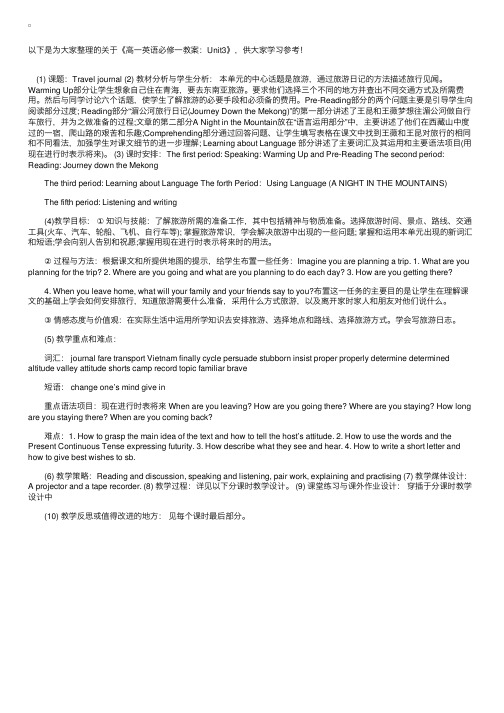
以下是为⼤家整理的关于《⾼⼀英语必修⼀教案:Unit3》,供⼤家学习参考! (1) 课题:Travel journal (2) 教材分析与学⽣分析:本单元的中⼼话题是旅游,通过旅游⽇记的⽅法描述旅⾏见闻。
Warming Up部分让学⽣想象⾃⼰住在青海,要去东南亚旅游。
要求他们选择三个不同的地⽅并查出不同交通⽅式及所需费⽤。
然后与同学讨论六个话题,使学⽣了解旅游的必要⼿段和必须备的费⽤。
Pre-Reading部分的两个问题主要是引导学⽣向阅读部分过度; Reading部分“湄公河旅⾏⽇记(Journey Down the Mekong)”的第⼀部分讲述了王昆和王薇梦想往湄公河做⾃⾏车旅⾏,并为之做准备的过程;⽂章的第⼆部分A Night in the Mountain放在“语⾔运⽤部分”中,主要讲述了他们在西藏⼭中度过的⼀宿,爬⼭路的艰苦和乐趣;Comprehending部分通过回答问题、让学⽣填写表格在课⽂中找到王薇和王昆对旅⾏的相同和不同看法,加强学⽣对课⽂细节的进⼀步理解; Learning about Language 部分讲述了主要词汇及其运⽤和主要语法项⽬(⽤现在进⾏时表⽰将来)。
(3) 课时安排:The first period: Speaking: Warming Up and Pre-Reading The second period: Reading: Journey down the Mekong The third period: Learning about Language The forth Period:Using Language (A NIGHT IN THE MOUNTAINS) The fifth period: Listening and writing (4)教学⽬标:①知识与技能:了解旅游所需的准备⼯作,其中包括精神与物质准备。
选择旅游时间、景点、路线、交通⼯具(⽕车、汽车、轮船、飞机、⾃⾏车等); 掌握旅游常识,学会解决旅游中出现的⼀些问题; 掌握和运⽤本单元出现的新词汇和短语;学会向别⼈告别和祝愿;掌握⽤现在进⾏时表⽰将来时的⽤法。
北师大高中英语必修一 Unit3 Lesson 1 Spring Festival 教学设计
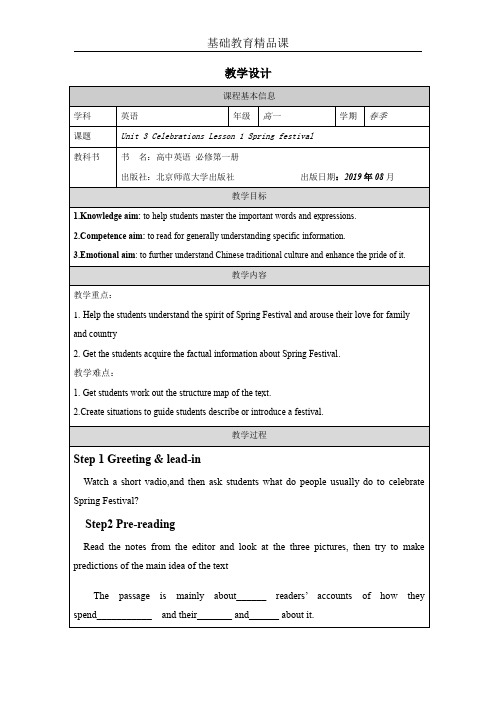
3.Emotional aim: to further understand Chinese traditional culture and enhance the pride of it.
For Li Yan, Spring Festival is_____________________
Step4 Further Thinking
1.Why does Spring Festival have different meanings in their eyes?
备注:教学设计应至少含教学目标、教学内容、教学过程等三个部分,如有其它内容,可自行补充增加。
教学内容
教学重点:
1.Help the students understand the spirit of Spring Festival and arouse their love for family and country
2. Get the students acquire the factual information about Spring Festival.
Watch a short vadio,and then ask students what do people usually do to celebrate Spring Festival?
Step2 Pre-reading
Read the notes from the editor and look at the three pictures, then try to make predictions of the main idea of the text
- 1、下载文档前请自行甄别文档内容的完整性,平台不提供额外的编辑、内容补充、找答案等附加服务。
- 2、"仅部分预览"的文档,不可在线预览部分如存在完整性等问题,可反馈申请退款(可完整预览的文档不适用该条件!)。
- 3、如文档侵犯您的权益,请联系客服反馈,我们会尽快为您处理(人工客服工作时间:9:00-18:30)。
Unit 3 Travel JournalPeriod1.Step 1.Warming up1.Ask some questions:2.Do you often travel? Where have you been?3.2. Following the steps of the warm-up on page 17.Step2. Pre-reading1. Show some traveling pictures of the teacher’s.2. Ask Ss : which river is the longest one in the world and which is the largest one; which river is the longest one in China.3. Ask Ss: how people who live along a river use it.Step3. While-reading1. Scanning: Ss read quickly and answer:What are they going to do?2. Skimming: Ss read again and finish comprehending 1 on page 19.Ss read and get the main ideas of each paragraph.Ss list the countries that the Mekong River flows through.Step4. After-readingSs in pairs and discuss: Wang Wei’s and Wang Kun’s simil ar and different attitudes about the trip.Similar attitudes about the trip Different attitudes about the tripBoth Wang Wei and Wang Kun think…1. Taking this trip is a dreamcome true.2. That they will enjoy this trip a lot.3. They should see a lot of the Mekong.4. That most of the Mekong will be found in Southeast Asia. Wang Wei believes…1. They must start in Qinghai where the river begins /see all of the Mekong.2. That they don’t need to prepare much Wang Kun believes…1. It is too cold and high to star t in Qinghai.2. That using an atlas is very important.Step5. Assignment1. Surf the internet and get more information about the Mekong River.2. Retell the passage use your own words.Period2.Step1. Warming upAsk some Ss to retell the passage that they have learnt last period.Step2. Learning about the languageTeacher explains some language points in the text on page 18.1.Persuade sb. into /out of sth. : cause sb. (not) to do sth. by arguing orreasoning with him 说服或劝说某人(不)做某事He is easily persuaded.Wang Kun couldn’t persuade his sister to change her mind. persuade sb. (that clause): cause sb. to believe sth.; convince sb. 使某人信服How can I persuade you that I am telling the truth?2.insist(v. ): demand (sth) forcefully, not accepting a refusal 坚持或坚决要求;eg. Since he insisted, I had to stay.insist on sth/doing sth: require or demand ; refuse to accept an alternative 一定要(某事物),坚决主张She insists on getting up early and playing her radio loud.3.care about: be worried, concerned or interested 忧虑,关心,惦念don’t you care about anybody?I don’t care about what happens to him.care for /to do: be willing or agree to do sth.; wish or like to do sth. Would you care a drink?Would you care to go for a walk?care for sb.1). Like or love sb.He cares for her deeply.2). Look after sb; take care of sb; be responsible for sbWho will care for your child if you are out?4.Once she has made up her mind, nothing can change it. 她一旦下了决心,什么也不能使她改变。
once: adv.1). for one time 一次I have only been here once.2). at some time in the past 一度;曾经He once lived in Zambia.3). all at once: suddenly 突然All at once the door opened.conj. = as soon as 一旦;一…就…Once you understand this rule, you’ll have no further difficulty.Step 3. Practice1. Ss finish Ex 1 and 2 on page 20 by themselves.2. check the answer.3. Ss do Ex 3. on page 20.4. Teacher gives Ss suggested answer and tell them why if the Ss have any problem.Step 4. Assignment1. Learn the useful expressions by heart.2. Finish Wb. Ex1 on page 56.3. Finish Wb. Ex 2 on page 57.Period 3.Step1. RevisionCheck the answers of Wb Ex 1 and 2 on page 56 and 57.Step2. Discovering useful structures1.Ss look at the following sentences and underline the verbs.Are you working this evening?We’re havi ng an English party this weekend.He is leaving tomorrow.Let Ss themselves find the rules and tell what tense they are used.2. Ss finish the dialogue on page 21 and pay attention to the tense. Suggested answers:are going, going, going/traveling, staying, are coming, coming, are going, 3. Ss finish part 3 on page 21.Step3. Talking1. Ss four in one group and have a discussion about the topic on page 55.2. Ss make a list about the objects: which is the most useful and which is the least useful and why.2.the most useful objects the least useful objects3.Ss show their result to the class.Step4. Speaking1. Ss work in pairs and discuss: what do you think a dam does to a river and the people who live on it?2. Make a list of some good and bad things a dam does.3. Discuss your report with your classmates and then show it in class. Step5. AssignmentFinish Wb Ex 1 using structures on page 57.Period4.Step1. Warming upAsk Ss some questions about Journey Down The Mekong (I).1. What was Wan g Kun and Wang Wei’s dream?2. What can they see when they travel along the Mekong?3. Will they have some difficulties in their journey? What are they?Step2. Reading1.Ss read the passage: a night in the mountains and answer the followingquestions:How does Wang Kun feel about the trip now?What do you think has changed his attitude?2. Ss make a dialogue about things happen the next morning before Wang Kun and Wang Wei leave their camp.3. show the dialogue to the class.Step3. Reading1. Ss read the passage: The End Of Our Journey on page 592. Ss fill in the form with the information from the travel journal.Topic Laos Cambodia VietnamPopulationWeatherLearningFarmingPeriod5. (Writing)Step1. Pre-writing1. Ss read the passage and get the general idea about it.2. Ss make a list of details from the travel journal that you believe are real and you don’t believe are real.Step2. While-writing1.Ss write a short letter to Wang Wei as one of her friend and ask her todescribe: how she feels, what she is doing, and some place you want to know about. Then wish her well on her journey by using some of the following expressions:Have a nice/good time.Have a nice/good trip.Good luck on your journey.Say “Hello” to …Give my love/best wishes to…Have fun.Take care.Write to me.2. Ss read their writing and check the mistakes by themselves.Ss exchange their writing and correct the mistakes.Ss rewrite the letter again.Step3. After-writingChoose some samples and show them in class.Tips on writing:Pay attention to the form of writing a letter.Pay attention to the tense while writing.Pay attention to the structures of the sentences.Step4. AssignmentSs in group 3-5, make an advertisement or finish the project on page 61.。
